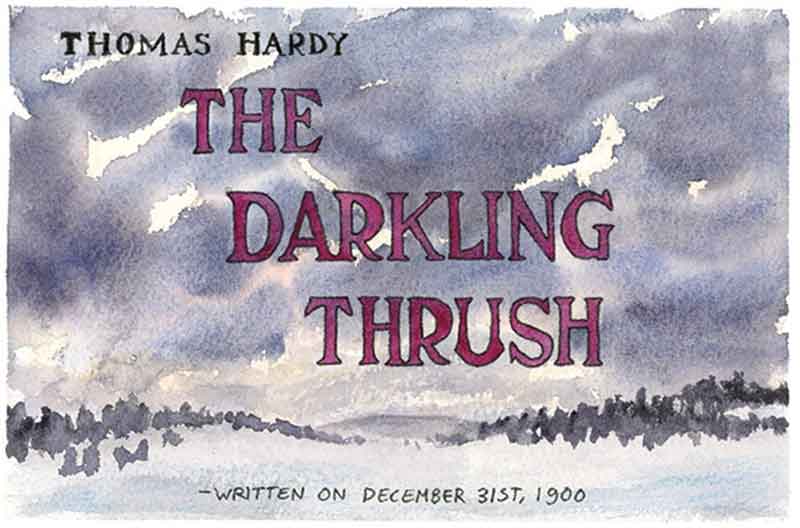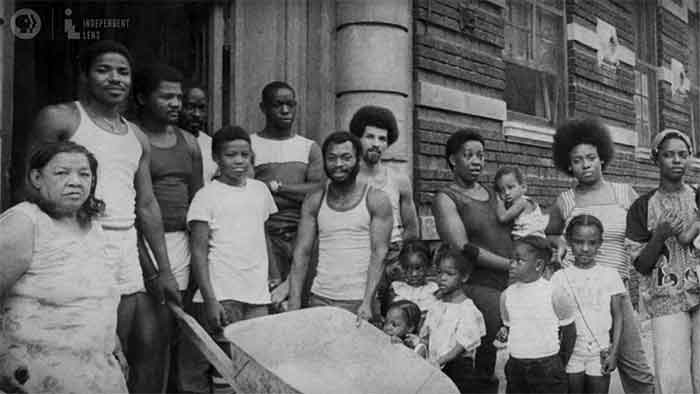
The poem runs:
I leant upon a coppice gate
When Frost was spectre-grey,
And Winter’s dregs made desolate
The weakening eye of day.
The tangled bine-stems scored the sky
Like strings of broken lyres,
And all mankind that haunted nigh
Had sought their household fires.
The land’s sharp features seemed to be
The Century’s corpse outleant,
His crypt the cloudy canopy,
The wind his death-lament.
The ancient pulse of germ and birth
Was shrunken hard and dry,
And every spirit upon earth
Seemed fervourless as I.
At once a voice arose among
The bleak twigs overhead
In a full-hearted evensong
Of joy illimited;
An aged thrush, frail, gaunt, and small,
In blast-beruffled plume,
Had chosen thus to fling his soul
Upon the growing gloom.
So little cause for carolings
Of such ecstatic sound
Was written on terrestrial things
Afar or nigh around,
That I could think there trembled through
His happy good-night air
Some blessed Hope, whereof he knew
And I was unaware.
Thomas Hardy’s (1840-1928) poetry explores a fatalist outlook against the dark, rugged landscape of his native Dorset. He rejected the Victorian belief in a merciful God, and much of his poetry reads as a sardonic lament on the bleakness of the human condition.
Hardy was disillusioned with how industrialization changed human beings and their relation to their environment. During the Victorian era, technologies such as railways, electricity, steam engines, and suspension bridges re-shaped millions of British working lives. Many flocked to cities to work in factories and live in row houses. The agricultural depression of the 1870s further depleted the number of remaining farmers. By the turn of the century, more than 80% of Britain’s population lived in cities. Due to these developments, people wanted to believe their lives had a purpose and that the future would be better for them. However, all the evidence during Hardy’s time belied any hope for a bright future. The wars (e.g. the Boer War of 1899-1902), which the British Empire waged all over the world in the name of civilizing “ignorant’’ peoples, as well as the degrading living conditions of the working class toiling in poverty in industrialized cities was depressing. These urban labourers were now cut off from any relationship to the land and the products of their work. Technological progress and scientific knowledge had not brought enlightenment to the masses. On the contrary, they got more misery and pain.
The poem is full of images, and it is powerful. Many lines are quotable. I will not unearth the denotative or connotative implications of Hardy’s wry words, phrases, similes and metaphors. But I stick to it, “And Winter’s dregs made desolate/ The weakening eye of day.” They manifest the unpalatable truth. Today augurs the beginning of a new year, a year that must be bleak, black, and cheerless. In the coming days, many ugly truths will blacken us. But two or three facts will shake us if we are not human animals.
One, More and more Palestinians will be killed, their children will die, and their women will be raped, killed and buried. Buried where? Even their burial places will be bombed and bulldozed.
Two are coming to India. Pran Prathisthan of Ram in Ayodhya was done yesterday by the Hindu Hridoy Samrat, Narendra Modi. Crores of Hindus have sung songs “Of joy illimited”. Media is abuzz with the details of the day’s rituals- when and how the messiah will grace the occasion. Headlines after headlines about the 30 January Pran Prathistahn ceremony and the formal inauguration of Ayodhya Ram Mandir on 22 January are flooding anywhere and everywhere, anyone and everyone. The rightists have their ways. The secularists are waiting for the Ram Mandir Invitation Card. And if they decline the offer, they are afraid of being accused of anti-nationals by the Hindutva leaders.
The death of democracy, the stripping of constitutional rights, and the end of India were done on the demolition day, December 1992. On 22 January, the fate of India as a Hindu Rashtra will get its official seal. Then I may sing Hardy’s lines :
So little cause for carolings
Of such ecstatic sound
Was written on terrestrial things
Afar or nigh around,
That I could think there trembled through
His happy good-night air
Some blessed Hope, whereof he knew
And I was unaware.
Those, on that inauguration day, who refuse to sing “carolings/ Of such ecstatic sound” of ‘Jai Shri Ram” will be punished. Wait. Whys? You already know. You learn when and how after the 2024 Lok Sabha election result.
Third, the climate conference COP28 is a mockery. We live in a capitalist world where profits will always matter far more than common sense, even if they pave the path to the end of the world — which appears to be precisely what is in store. What will today’s politicians and economists say to future generations? Sorry that in the hottest year on record, we partied in Dubai and did almost nothing to shift our planet’s orbit away from the path to Armageddon? (Mahir Ali)
Not to talk of the Russia-Ukraine War, which enters 676 days on this day, fresh incidents of violence from Manipur’s Moreh Town are coming, deaths in adivasi homelands, bulldozing of Muslim houses and their places of worship, etc.
Reading Hardy’s “The Darkling Thrush” against the said backgrounds will give the poem a new lease of life, where the unknowing birds may sing for a new year. But the knowing few may find with Hardy “So little cause for carolings,” for it is a world of “the growing gloom”.
References:
- https://poets.org/poet/thomas-hardy
- https://philarchive.org/archive/RAYTDT
- https://freevoice.co.in/cop28-was-just-another-milestone-on-the-highway-to-hell/
- https://www.youtube.com/watch?v=MDeZN3GoY6s
Bio
Abu Siddik is an assistant professor of English at Plassey College, West Bengal. He is an independent researcher, a poet, and a short story writer. He loves to write about the struggle and resilience of the marginalized Indian people, the underdogs, the outcasts, and the invisible. He has 12 books. His recent publication includes Identity and Belonging: Mapping the Margins, Banger Musolman: Samaj Pironer Dahan Brittanto and Violence in Literature, Culture and Society (ed.). His latest book is Lynching in Indian Literature, Culture and Society. Website: www.abusiddik.com. He runs two literary and cultural websites: https://freevoice.co.in/ and https://vinnokatha.in/.















































